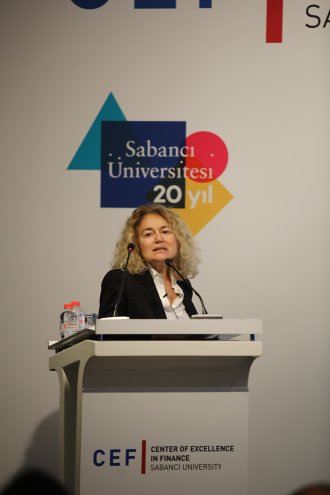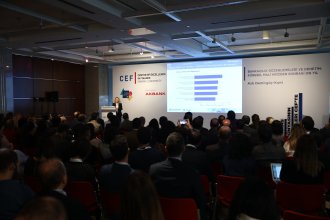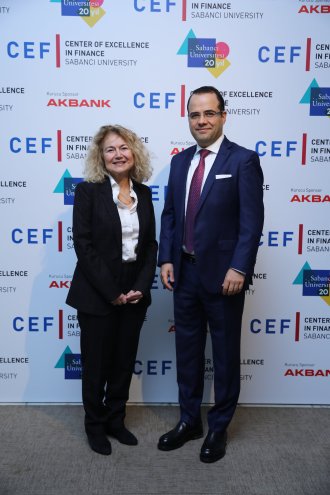Aslı Demirgüç-Kunt, World Bank's Chief Economist for Europe and Central Asia, was the guest of Sabancı University Center of Excellence in Finance (CEF) for a seminar sponsored by Akbank in November.
Aslı Demirgüç-Kunt, Chief Economist of Europe and Central Asia Region of the World Bank, was the guest of Sabancı University Center of Excellence in Finance (CEF) on November 15th for the “Banking Regulations and Supervision: Ten Years After the Global Financial Crisis” seminar.
Aslı Demirgüç-Kunt, World Bank's Chief Economist for Europe and Central Asia, was the guest of Sabancı University Center of Excellence in Finance (CEF) for a seminar sponsored by Akbank in November. In the seminar held at Sabancı Center on November 15th, Demirgüç-Kunt delivered a presentation on “Banking Regulations and Supervision: Ten Years After the Global Financial Crisis”.
Aslı Demirgüç-Kunt said "The global financial crisis really brought about a very intense process of reorganization. This is seen in both high-income countries and developing countries." Demirgüç-Kunt touched upon the developments in the decade after the economic crisis and the report prepared on this issue.
Demirgüç-Kunt stated that the global economic crisis led to a lot of reform efforts and said that these reforms were seen in the area of banking supervision and regulation.
Demirgüç-Kunt said that a decade has passed after the economic crisis and added that they had prepared various reports to investigate the effects of the crisis. "The economic crisis hit the economies with high income. For this reason, we focused more on these economies. We also wanted to touch upon the impact of the crisis on developing countries. We have been able to present a large data report on bank audits and regulations. This data report includes surveys covering the period after the crisis. That is, we have examined how the effects of the crisis have transformed and changed since the crisis. New data analyses and research also contribute to our policy discussions."
Aslı Demirgüç-Kunt shared the results of a study on banking supervision and regulations with the representatives of the financial sector. She said “Around 80 percent of the participants said that financial regulations are needed and are useful to reduce international shocks. Around 60 percent touched upon the risks resulting from regulations caused by reforms and banking risks.”
Regarding the total impact of regulatory reforms, Demirgüç-Kunt said, “We looked at the impact of the reforms in developing countries. Only 45 percent of the respondents said these effects would be positive, while the rest thought they would either have no effect or have a negative effect. In fact, there are many different opinions. This diversity also shows that there are very few data and analyzes."
"People’s memories of the crisis are left behind"
Aslı Demirgüç-Kunt pointed out that the global financial crisis brought about a very intensive reregulation process. "This is seen in both high-income countries and developing countries. People's memories of the crisis are slowly left behind. Regulatory institutions, states and governments perhaps display a greater attitude of abstention because people have gradually started to forget the crisis."
Aslı Demirgüç-Kunt stated that they believe that more steps should be taken in general. “The results are pleasing in terms of market discipline and capital requirements. Very good work has been done, but we know that the resolution of the crisis has ultimately led to many rescue packages."
Aslı Demirgüç-Kunt stated that they have not yet seen whether the reforms implemented to prevent excessive risks are sufficiently effective or not, and that market discipline has not improved as much as desired yet, and mixed results are seen in capital requirements.
Stating that they have been working in different fields in different countries for many years, Aslı Demirgüç-Kunt stated that a single solution is not suitable for every country and that not every solution can be useful in developing countries.
"Technological advancements bring along a number of risks"
Demirgüç-Kunt stressed that it is very important to work on issues of transparency and information sharing and said, "The work of regulatory and supervisory agencies will become more difficult in the coming days, because globalization and technological developments continue. In the end, maybe everything will be more difficult. Technological developments and changes bring about a number of opportunities, as well as many risks."
About Aslı Demirgüç-Kunt
Aslı Demirgüç-Kunt is the Chief Economist of the Europe and Central Asia Region of the World Bank. Over her 30-year career in the World Bank, she has also served as the Director of Research, Director of Development Policy, and the Chief Economist of the Finance and Private Sector Development Network, conducting research and advising on financial and private sector development issues.
Demirgüç-Kunt who also developed the Global Financial Development Report series and the Global Findex financial participation database, served as the President of the International Atlantic Economic Community (2013-14) and the Director of the Western Economic Association (2015-18) and is on the editorial boards of various professional journals.
Prior to working for the World Bank, she was an Economist at the Federal Reserve Bank of Cleveland. She holds a Ph.D. and M.A. in economics from Ohio State University.



6698 sayılı Kişisel Verilerin Korunması Kanunu (“Kanun”) uyarınca, kişisel verileriniz; veri sorumlusu olarak Sabancı Üniversitesi (“Üniversite”) tarafından aşağıda açıklanan kapsamda işlenebilecektir.
Sabancı Üniversitesi’nin, bilimde, teknolojide ve toplum üzerinde dönüştürücü etkileri olan yenilikçi araştırma ve eğitim faaliyetlerindeki öncü konumu çerçevesinde Sabancı Üniversitesi Finans Mükemmeliyet Merkezi’nin düzenlediği programların (“Program”) bitiminde tarafınıza sunulmak üzere tercihinize bağlı olarak katılım sertifikanızın NFT (non-fungible token) şeklinde hazırlanması arzu edilmektedir. Hızlı gelişen günümüz dünyasında oldukça popüler olan NFT’ler tümüyle dijital nitelikli varlıklar olup, dijital bir varlığın sahipliğini kanıtlayabilen ve bu varlığın benzersiz olduğunu onaylayan, blok zinciri (blockchain) adı verilen dijital defterde depolanan veri birimleridir. Program bitiminde tarafınıza tercihinize bağlı olarak katılım sertifikanızın NFT olarak sunulması amacıyla işlenebilecek kişisel verileriniz ile ilgili olarak sizleri bilgilendirmek isteriz. Bu çerçevede;
Kişisel Verilerin Hangi Amaçlarla İşleneceği ve Hukuki Sebebi
Toplanan kişisel verileriniz, aşağıda yer alan amaçlar (“Amaçlar”) ve hukuki sebepler ile Kanun’un 5. maddesinde belirtilen kişisel veri işleme şartları ve amaçları dahilinde işlenebilecektir.
Bir sözleşmenin kurulması veya ifasıyla doğrudan doğruya ilgili olması kaydıyla, sözleşmenin taraflarına ait kişisel verilerin işlenmesinin gerekli olması hukuki sebebine dayalı olarak;
İlgili kişinin temel hak ve özgürlüklerine zarar vermemek kaydıyla, veri sorumlusunun meşru menfaatleri için veri işlenmesinin zorunlu olması hukuki sebebine dayalı olarak;
Bir hakkın tesisi, kullanılması veya korunması için veri işlemenin zorunlu olması hukuki sebebine dayalı olarak;
Kanunlarca açıkça öngörülmesi ve veri sorumlusunun hukuki yükümlülüğünü yerine getirebilmesi için zorunlu olması hukuki sebebine dayalı olarak;
Açık rızanızın varlığı halinde;
İşlenen Kişisel Verilerin Kimlere ve Hangi Amaçla Aktarılabileceği
Toplanan kişisel verileriniz; yukarıda yer alan Amaçlar’ın gerçekleştirilmesi doğrultusunda kanunlarda açıkça öngörülmesi ve hukuki yükümlülüklerimizin yerine getirilmesi kapsamında kanunen yetkili kamu kurumları ve kanunen yetkili özel kişilere, açık rızanızın varlığı halinde, açık rızanıza dayalı olarak Program kapsamında tarafınıza katılım sertifikanızın NFT şeklinde sunulması amacıyla kullanılan OpenSea NFT platformunun sağlayıcısı sunucuları yurt dışında bulunan Ozone Networks, Inc.’e ve diğer Program katılımcılarına Kanun’un 5. maddesinde düzenlenen kişisel veri işleme şartları çerçevesinde Kanun’un 8. ve 9. maddelerinde belirtilen kişisel verilerin aktarılmasına ilişkin kurallara uygun olarak aktarılabilecektir.
Kişisel Veri Toplamanın Yöntemi
Kişisel verileriniz, Üniversitemiz tarafından yukarıda belirtilen Amaçlar doğrultusunda elektronik ortamda e-posta, çevrim içi formlar, internet sitemiz, tarafınızla gerçekleştirdiğimiz telefon görüşmeleri ve fiziki ortamda katılım formları üzerinden toplanmaktır.
İlgili Kişinin Kanun’un 11. Maddesinde Sayılan Hakları
Kişisel verilerinize yönelik Kanun’un 11. maddesi uyarınca aşağıdaki haklara sahip olduğunuzu bildiririz:
Yukarıda yer alan haklarınıza ilişkin taleplerinizi sizi tanımamıza ve iletişime geçebilmemize yardımcı olabilecek şekilde kimlik (ad-soyad, T.C. kimlik numarası), telefon, e-posta, adres bilgilerinizi de ekleyerek yazılı ve imzalı olarak Sabancı Üniversitesi Orta Mahalle Üniversite Caddesi No:27 Tuzla İstanbul adresine posta ile taahhütlü gönderebilir, şahsen başvurunuzu teslim edebilir veya ilgili başvurunuzu sabanciuniversitesi@hs03.kep.tr adresine güvenli elektronik imzalı olarak iletebilirsiniz. Üniversitemiz talebin niteliğine göre talebi en kısa sürede ve en geç otuz gün içinde ücretsiz olarak sonuçlandıracaktır. Ancak, işlemin ayrıca bir maliyeti gerektirmesi hâlinde, Üniversitemiz tarafından Kişisel Verileri Koruma Kurulunca belirlenen tarifedeki ücret alınabilecektir.